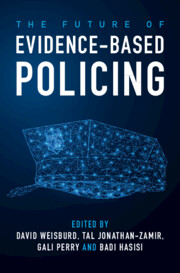Refine search
Actions for selected content:
7 results
13 - Evidence-Based Policing and the Law
- from Part IV - Challenges to the Implementation of Evidence-Based Policing
-
-
- Book:
- The Future of Evidence-Based Policing
- Published online:
- 01 June 2023
- Print publication:
- 15 June 2023, pp 252-270
-
- Chapter
- Export citation
14 - The Role of the “Super Evidence Cop” in Evidence-Based Policing
- from Part V - The Practitioner’s Perspective
-
-
- Book:
- The Future of Evidence-Based Policing
- Published online:
- 01 June 2023
- Print publication:
- 15 June 2023, pp 273-291
-
- Chapter
- Export citation
1 - The Future of Evidence-Based Policing
-
-
- Book:
- The Future of Evidence-Based Policing
- Published online:
- 01 June 2023
- Print publication:
- 15 June 2023, pp 1-16
-
- Chapter
- Export citation
4 - A Way Ahead
- from Part I - Taking Stock of Evidence-Based Policing
-
-
- Book:
- The Future of Evidence-Based Policing
- Published online:
- 01 June 2023
- Print publication:
- 15 June 2023, pp 64-82
-
- Chapter
- Export citation
9 - The Potential Contribution of Subjective Causality to Policing Research
- from Part III - Innovations in Tools of Evaluation and Assessment
-
-
- Book:
- The Future of Evidence-Based Policing
- Published online:
- 01 June 2023
- Print publication:
- 15 June 2023, pp 170-190
-
- Chapter
- Export citation
3 - Re-inventing Policing
- from Part I - Taking Stock of Evidence-Based Policing
-
-
- Book:
- The Future of Evidence-Based Policing
- Published online:
- 01 June 2023
- Print publication:
- 15 June 2023, pp 44-63
-
- Chapter
- Export citation

The Future of Evidence-Based Policing
-
- Published online:
- 01 June 2023
- Print publication:
- 15 June 2023
